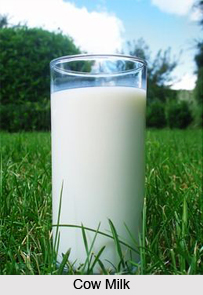 Cow milk is one of the important parts of Panchagavya and the other four parts are dung, urine, curd and ghee, all derived from cow. According to Ayurveda, milk is very good for health. Ayurveda states that milk gives mass, sweetness and coolness to meal. Milk is very effective and beneficial for the nursing mother. Milk helps to strengthen heart in some constitutions. It also aids in accumulating phlegm in certain others, also creates congestion where it is not much needed.
Cow milk is one of the important parts of Panchagavya and the other four parts are dung, urine, curd and ghee, all derived from cow. According to Ayurveda, milk is very good for health. Ayurveda states that milk gives mass, sweetness and coolness to meal. Milk is very effective and beneficial for the nursing mother. Milk helps to strengthen heart in some constitutions. It also aids in accumulating phlegm in certain others, also creates congestion where it is not much needed.
Cow milk in Ayurveda
Ayurveda suggests that milk is damaging when it is taken in cold, homogenized form, combined with unsuitable foods or are taken in excess. The secret of milk being a healthy food is in the way it is consumed, prepared and stored. Ayurveda recommends intake of raw milk, which is never pasteurized or homogenized. Boiling the milk before serving is also very necessary, because it denatures the protein in milk and makes it easily digestible as it is broken into amino acids. The addition of various spices like cinnamon, cardamom, gingers and black pepper is also helpful in balancing the cooling properties.
Ayurveda mentions that pasteurization is certainly an effective process to cleanse milk from the bacteria but the process does nothing to make milk more digestible or to check the other potential ways that created contamination. Thus, modern way of processing milk is more harmful than to make it healthier. Until milk is well boiled, anything at a lower temperature results in partial breakdown of milk proteins, which makes them almost impossible to digest. Homogenization also does nothing to increase the good properties of milk. This may result in arteriosclerotic clots and causes severe heart problems.
According to ancient Indian science, cow milk should not be tampered, preferably boiled with spices and should not be stored for long time. As per Ayurveda, milk can be consumed in specific forms. The milk can be boiled with half a teaspoon of grated nutmeg, or two teaspoon of clarified butter or ghee and one teaspoon of coriander powder. Another option is to boil a cup of milk and a cup of water with a teaspoon of freshly grated ginger and three or four cardamoms and then simmering in reducing heat for five minutes. It should be stirred with half a teaspoon of ghee just before drinking and then it should be taken when it is still warm. The drink will induce a calm sleep and help in digestion too. Panchagavya obtained from cow are used in production of various medicines, manure, pesticides, dhoop, toothpowder, bath soaps etc. It is highly beneficial in these diseases like Epilepsy, Swelling, Fever, Jaundice, Cough etc.
 Panchagavya and Religion
Panchagavya and Religion
The description of cow being the abode of all Gods and the medium of achieving Dharma, Artha, Kama and Moksha is found in many ancient Indian texts. In Vedic Literature, Prithvi is the synonym of Gau (Cow). In ancient times, a man"s abundance was judged by the number of cows he possessed. History gives evidence that the Indians were in the peak of health when the cow was respected. There was commercialization of cow products in ancient times. Milk and grains were given free of cost. Milk was offered instead of water. Rightly said, streams of milk and curds traversed this country. This was the reality some years back.
Medicinal properties of Cow Milk
Cow milk is sweet in taste, heavy to digest and has coolant effect on body and mind. It contains ojas factor that improves body immunity. It acts as a natural aphrodisiac. Cow milk is the best thing to be consumed by newborn next to breast milk. It has 10 properties like Swadu, Sheeta, Mrudu, Snigdha, Bahala, Shlakshna, Picchila, Guru, Manda and Prasanna. As per Ashtanga Sangraha cow milk contains Jeevaneeya for enlivening, Rasayana for rejuvenating, anti aging, Medhya as Brain tonic that improves intelligence, Balya that improves strength and immunity, Stanya that improves lactation and Sara as laxative that promotes movement of liquids in channels. Milk is a rich source of calcium, it is found that a regular intake of milk and
yogurt is associated with higher bone mineral density in the hip. It is suggested that choosing low-fat milk / yogurt over cream can increase intake of protein, calcium and vitamin D while limiting intake of saturated fats.




















